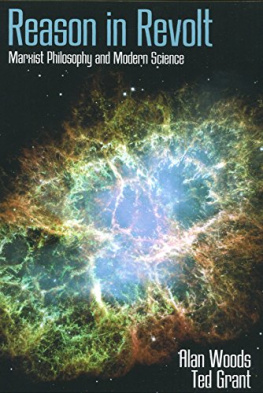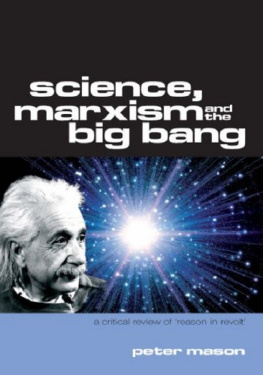Alan Woods - Reason in Revolt: Marxist Philosophy and Modern Science
Here you can read online Alan Woods - Reason in Revolt: Marxist Philosophy and Modern Science full text of the book (entire story) in english for free. Download pdf and epub, get meaning, cover and reviews about this ebook. year: 1995, publisher: Wellred, genre: Religion. Description of the work, (preface) as well as reviews are available. Best literature library LitArk.com created for fans of good reading and offers a wide selection of genres:
Romance novel
Science fiction
Adventure
Detective
Science
History
Home and family
Prose
Art
Politics
Computer
Non-fiction
Religion
Business
Children
Humor
Choose a favorite category and find really read worthwhile books. Enjoy immersion in the world of imagination, feel the emotions of the characters or learn something new for yourself, make an fascinating discovery.
- Book:Reason in Revolt: Marxist Philosophy and Modern Science
- Author:
- Publisher:Wellred
- Genre:
- Year:1995
- Rating:5 / 5
- Favourites:Add to favourites
- Your mark:
- 100
- 1
- 2
- 3
- 4
- 5
Reason in Revolt: Marxist Philosophy and Modern Science: summary, description and annotation
We offer to read an annotation, description, summary or preface (depends on what the author of the book "Reason in Revolt: Marxist Philosophy and Modern Science" wrote himself). If you haven't found the necessary information about the book — write in the comments, we will try to find it.
Alan Woods: author's other books
Who wrote Reason in Revolt: Marxist Philosophy and Modern Science? Find out the surname, the name of the author of the book and a list of all author's works by series.
Reason in Revolt: Marxist Philosophy and Modern Science — read online for free the complete book (whole text) full work
Below is the text of the book, divided by pages. System saving the place of the last page read, allows you to conveniently read the book "Reason in Revolt: Marxist Philosophy and Modern Science" online for free, without having to search again every time where you left off. Put a bookmark, and you can go to the page where you finished reading at any time.
Font size:
Interval:
Bookmark:
1995
A growing number of scientists are becoming discontented with the old outlook. The rapid rise of the theory of Chaos and Complexity is one of the most significant developments in science at the turn of the new millennium. Many of the ideas expressed by this new trend are strikingly similar to the theories of dialectical materialism worked out by Marx and Engels over 150 years ago. A significant part of the present work is devoted to an exploration of the relationship between Marxist philosophy and the new theories. Will this encounter provide the basis for a new and exciting breakthrough in the methodology of science?
The achievements of science and technology during the past century are unparalleled in history. They provide the potential for the solution to all the problems faced by the planet, and equally for its total destruction. Allegedly scientific theories are being used to prove that criminality is caused, not by social conditions, but by a criminal gene. Black people are alleged to be disadvantaged, not because of discrimination, but because of their genetic make-up. Of course, such science is highly convenient to right-wing politicians intent on ruthlessly cutting welfare.
In the field of theoretical physics and cosmology there is a growing tendency towards mysticism. The Big Bang theory of the origin of the universe is being used to justify the existence of a Creator, as in the book of Genesis . For the first time in centuries, science appears to lend credence to religious obscurantism. Yet this is only one side of the story.
A growing number of scientists are becoming discontented with the old outlook. The rapid rise of the theory of Chaos and Complexity is one of the most significant developments in science at the turn of the new millennium. Many of the ideas expressed by this new trend are strikingly similar to the theories of dialectical materialism worked out by Marx and Engels over 150 years ago.
A significant part of the present work is devoted to an exploration of the relationship between Marxist philosophy and the new theories. Will this encounter provide the basis for a new and exciting breakthrough in the methodology of science?
Table of Contents
Part One: Reason and Unreason
Part Two: Time, Space and Motion
Part Three: Life, Mind and Matter
Part Four: Order Out of Chaos
Exactly twenty years have passed since the publication of Reason in Revolt. The book was greeted with enthusiasm by many people, not only on the Left, but by scientists and others interested in philosophy and the latest developments in science.
One of the most common accusations directed against Engels is that he based himself on the science of the 19th century and therefore is out of date. But in fact, the discoveries of modern science which support theories such as chaos and complexity provide far more material that shows that Engels was right when he said that, in the last analysis, nature works dialectically. The latest discoveries of science have fundamentally modified the old view of evolution as a slow, gradual process, uninterrupted by sudden catastrophes and leaps.
In the field of palaeontology the late Stephen Jay Goulds revolutionary theory of punctuated equilibria now generally accepted as correct has completely overthrown the old view of evolution as a slow, gradual process, uninterrupted by sudden catastrophes and leaps. The forms of life evolve that are well adapted to take advantage of a given environment, but the very specialisation that fits them for a given evolutionary context turns into its opposite when conditions change. And because life itself is often poised on the edge of chaos, even relatively small changes can produce catastrophic consequences. We have noticed this phenomenon being repeated many times during millions of years of evolution.
We pointed out that Gould was influenced by the ideas of Marxism, and in particular by Engels masterpiece The Part Played by Labour in the Transition from Ape to Man, which he warmly praised. In fact, Gould pointed out that if scientists had only paid attention to what Engels had written the investigation of human origins would have been spared a hundred years of errors.
Since Reason in Revolt first appeared, there have been a number of spectacular advances in science notably the human genome. These results have completely demolished the positions of genetic determinism that we criticised in the book. They have also dealt a mortal blow to the nonsense of the Creationists and the supporters of so-called intelligent design who want to reject Darwinism in favour of the book of Genesis.
If we accept the idea of intelligent design, it must be confessed that the Creator did not make a very good job of it. One recalls the words of Alfonso the Wise who said: Had I been present when the Almighty made the Universe, I could have given Him some good advice.
Stephen Jay Gould pointed out that if a truly intelligent designer were responsible for the panda, he would have provided a more useful tool than the stubby proto-thumb that pandas use to laboriously strip bamboo in order to eat it.
One could multiply such examples at will. Why, for instance, should humans be designed to walk upright when our skeletons are designed to move about on all fours? It is hard to see how an all-wise Creator could have made such a mess of things, creating a world in which hunger, disease, wars and death play such a prominent role unless He really hated the world and the human race. But in that case, what we have before us is not so much a case of intelligent design, but, rather, unintelligent or malignant design.
The discoveries of the human genome conclusively prove that humans are not the unique creation of the Almighty, but the product of billions of years of evolution. We carry the living proof of this in our genes. We share our genes, not only with the apes and other mammals, but with the lowly fruit fly and bacteria, and with creatures even older and more primitive than bacteria. Our genetic makeup is a map of evolution and the clearest proof of it. But there are none as blind as those that will not see.
The human genome results should also finally finish off the nonsense of creationism. It should cure us once and for all of that arrogance that for thousands of years has tempted men and women to claim for themselves a privileged status in nature that expresses itself in the belief that we can have a special intercourse with supernatural forces (God) and thus escape from our mortal destiny and achieve eternal life, which, on closer inspection, bears a striking resemblance to eternal death.
New discoveries in biology are constantly obliging us to update the theories of the origins of life on earth. Even in the twenty years since Reason in Revolt was first published, new theories have been put forward. It is most probable that life on earth began very early on at the bottom of the sea, in the form of minute organisms that derived sustenance from the volcanic energy that came from undersea volcanic vents. These early life forms thus did not require sunlight. They developed in conditions that were incredibly hostile. These minute bacteria over a long period provided the oxygen that was necessary to transform the atmosphere and create the conditions necessary for the development of life as we know it. We owe everything to these humble bacteria!
It is interesting to observe in nature how life forms that have dominated the planet for very long periods have been made extinct as soon as the material conditions that determined their evolutionary success have changed. It is equally fascinating to see how these previously dominant species have been replaced by other species that were seemingly insignificant and even species that seemed to have no prospect of survival.
Font size:
Interval:
Bookmark:
Similar books «Reason in Revolt: Marxist Philosophy and Modern Science»
Look at similar books to Reason in Revolt: Marxist Philosophy and Modern Science. We have selected literature similar in name and meaning in the hope of providing readers with more options to find new, interesting, not yet read works.
Discussion, reviews of the book Reason in Revolt: Marxist Philosophy and Modern Science and just readers' own opinions. Leave your comments, write what you think about the work, its meaning or the main characters. Specify what exactly you liked and what you didn't like, and why you think so.













